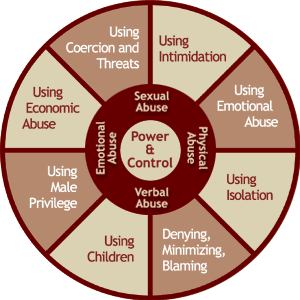Anger, Relationship Abuse
How to overcome domestic abuse and trauma
There is a common assumption among modern society that abuse and trauma are things which happen to other people.In a perfect world, no one would have to go through the physical, psychological, and emotional stress of dealing with abuse, domestic violence, bullying, the loss of loved ones, or other traumatic events.Unfortunately, we live in a world where abusive spouses and bullies exist, one in which bad things sometimes happen no matter how good a person you are.
There are many things which people can do if they are dealing with the stress, upset, and the psychological ramifications of some type of trauma, be it physical or mental.While not all methods work for all people, and not all people will require all of these suggestions, many people find the following helpful.
Get Safe
The first step, especially if you are in an abusive relationship, is to make sure that you are physically safe.This may mean addressing the abuser or bully or it may mean extricating yourself from the situation all together.If this is required, make sure that you do so in a way which will insure your continued safety.Leaving someone with whom you have had a long term relationship is not easy.A lot of planning is required before doing so. There are numerous organizations which can help you with this process.
It’s Not You
One of the first steps in recovering from a traumatic experience is acknowledging that the event, be it abuse, bullying, or an accident, is not part of who you are. It may shape your experiences.It may have changed you in subtle and not so subtle ways, but it is not who you are.It does not define you.Something bad happened to you, but it is not who you are.
Similarly, it is not the result of something that you did.No one deserves to be abused. Accidents happen every day.If you were abused, it is the fault of the person who did the abuse.That is the person who is responsible.
This can be extremely difficult. Our natural response is to replay events in our heads to try and determine what, if anything, we could have done to change the outcome.In many cases, there is simply nothing that could be done.More importantly, regardless of what could or could not be done, what one may or may not have done differently, the experience is in the past.Part of recovery means acknowledging that the trauma is over.
This does not mean that you have to forget what was done, nor should you feel bad if you constantly replay scenarios in your head.
Your Experience is Valid
Different people react to situations differently.That is simply part of human nature. One person may be robbed at gunpoint and never think about it again while another may shut down completely and refuse to go outside.Whatever the experience and your reaction to it, do not feel bad, ashamed,or embarrassed.Your reactions to a traumatic experience are a valid and essential portion of who you are.You do not need to hide them or attempt to downplay them.Healing is not about suppression.Healing comes from accepting what happened and learning to deal with it.
You’re Not A Victim
If you have lived through a traumatic event, there may be a natural inclination to think of yourself as a victim.This can be an extremely dangerous mind-set and one which it is difficult to break out of.Remember that while you have experienced something negative, this does not mean that you are a victim.It is important to shed the identification as a victim in order to begin healing.
You’re Not Crazy
Being away from the source of the physical trauma does not necessarily mean that the emotional and psychological effects will cease.In fact, people often exhibit a number of physical and emotional symptoms long after they are free from the previous threat.These include:
- Flashbacks, nightmares, reliving the event —The source of the trauma could be a person (like an abuser or bully) or an event (an accident, the death of a loved one, the loss of a job). Either way, the trauma can leave lasting scars which are often relived while both awake and asleep.
- Hyper-vigilance— This is part of the body’s natural defense mechanism. Those who experience trauma remain hyper-aware of their surroundings.This may mean that they appear skittish, are jumpy or easily frightened, or constantly checking their surroundings for potential threats. This can lead to lack of interaction with others and difficulty concentrating.It is hard to focus on what is in front of you if you are always looking over your shoulder.
- Avoidance Behavior — This is an almost natural extension of the hyper-vigilance discussed above. People who have experienced trauma seek naturally to avoid situations similar to those which they experienced as traumatic.If someone was in or witnessed an airplane accident, they may develop a fear of flying. Someone who was mugged may choose to remain indoors, losing touch with friends and loved ones and avoiding things which they previously found enjoyable.If they experienced physical abuse at the hands of a loved one, they may shy away from meeting new people or getting close to anyone new.
It is important to realize that these are all natural reactions. They do not mean that there is something wrong with you or that you are never going to feel better. What it does mean is that at present, you may need a little help to get back on to an even keel.

You’re Not Alone
As mentioned in the opening, we live in a world where bad things happen. While you may not want to talk about what happened, or even acknowledge what happened, talking to someone can be very therapeutic.The first thing to realize is that you are not alone. There are many people who have experienced horrible, traumatic events.There are people who have suffered abuse at the hands of a love one, that have been bullied by friends and family or strangers, that have had to deal with the sudden loss of a loved one or a job, or any number of things.While this may seem depressing to contemplate, many of them are willing to reach out and help other survivors.
While there may be some residual stigma associated with asking for professional or semi-professional help, this should not stop you from getting the help that you need. There is nothing wrong with seeing a therapist or attending a support group. These people are there to help you, to place you on the road to recovery, and to be there if you need them.
Other people find writing about the event can be helpful.Many therapists suggest keeping a journal. This can be especially helpful for those who are experiencing Post Traumatic Stress Disorder. Survivors can write down what they were doing when they start experiencing flashbacks, panic attacks, or other psychological symptoms.Identifying one’s triggers is extremely helpful.
Another helpful journal activity is to write about the experience in the third person. The survivor writes down everything that happened, but as if it happened to someone else. They even provide the characters with different names.This allows the survivor to examine the experience with a level of detachment.
Those who have experienced physical abuse, betrayal, or the loss of a sense of security which comes from a break-in, robbery, or other similar crime, may benefit from bringing an animal companion into their lives.The sense of responsibility which is required in pet companionship allows the survivor to focus on something other than their experiences. Having a rabbit, cat or dog around may help survivors feel safer.Most importantly, the unconditional love which an animal provides will help the survivors realize that they do deserve affection and that it is possible to connect again without getting hurt.
Love Defends.Love Protects.Love Restores.Love Empowers ✿
Posted by Guest Blogger: Shenita Etwaroo
Dr. Shenita Etwaroo is an author, artist, animal advocate, activist, and a vegan, who has devoted her life to helping the voiceless for the glory of God.In memory of her beloved Neo and animal companions, she has been aligned with animal rights groups and human rights groups, and shelters to spread awareness and protest injustice.Her works of fiction and non-fiction alike are homage to an active voice for the innocent, oppressed, and vulnerable everywhere.

